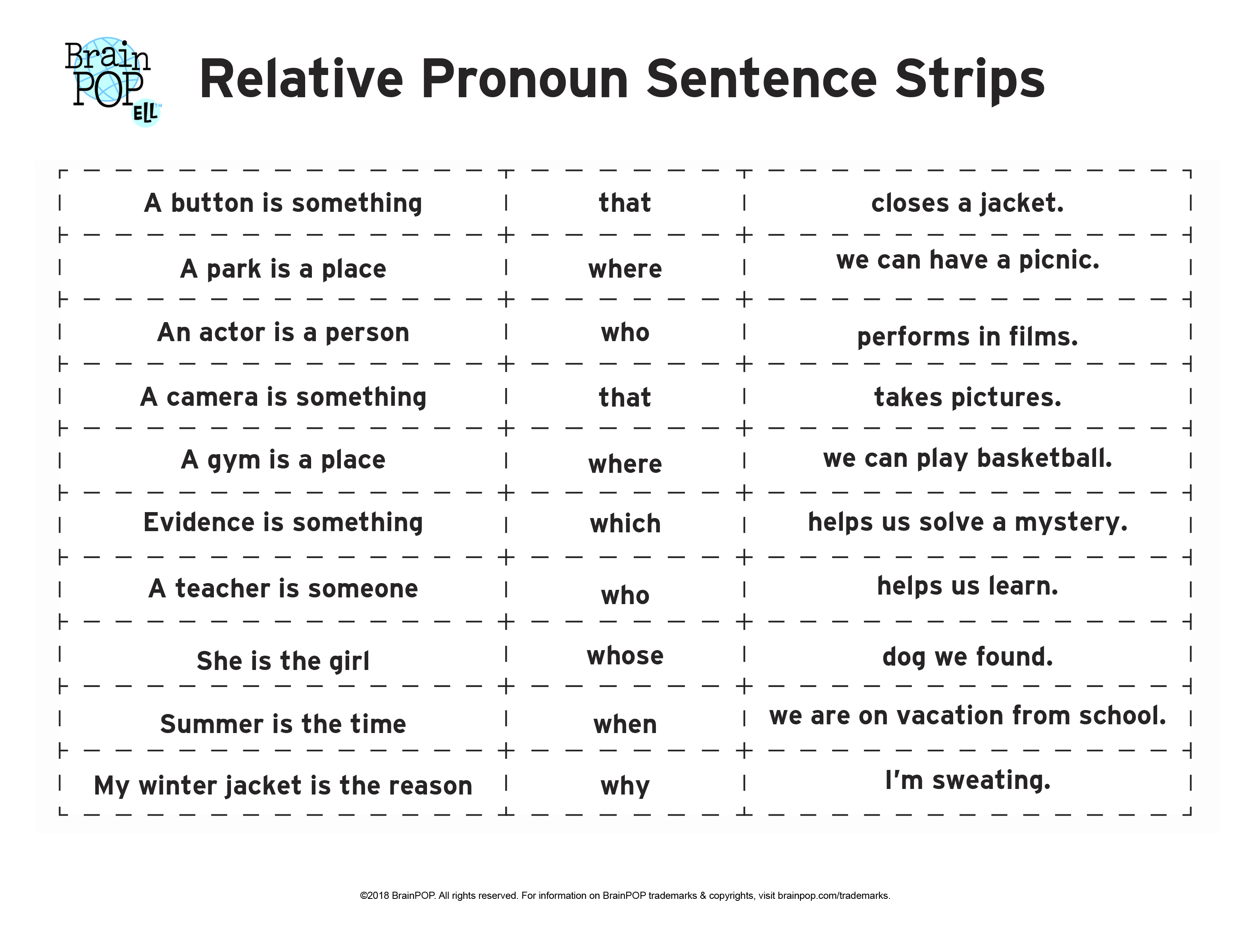
Relative Pronouns Sentence Strips BrainPOP Educators
A pronoun is a word that replaces a noun in a sentence. You may already know that a noun is a person, place, thing, or idea. A pronoun is a word you can substitute for one of these things. For example, in this sentence, the pronoun she replaces Miranda. However, you can't just use the pronoun she every time you're talking about Miranda.

Pronoun Examples Sentences In English EduForKid
Subject Pronouns Example Sentences 1." I am taking this class because it will fulfill the requirement for English." 2. " He is wearing a suit today." 3. " It is my turn to talk." 4. "Do you want me to help?" 5. " He is working in the office today." 6. " It does not make sense to me." 7. " We are going to class now." 8. " They want to leave early."
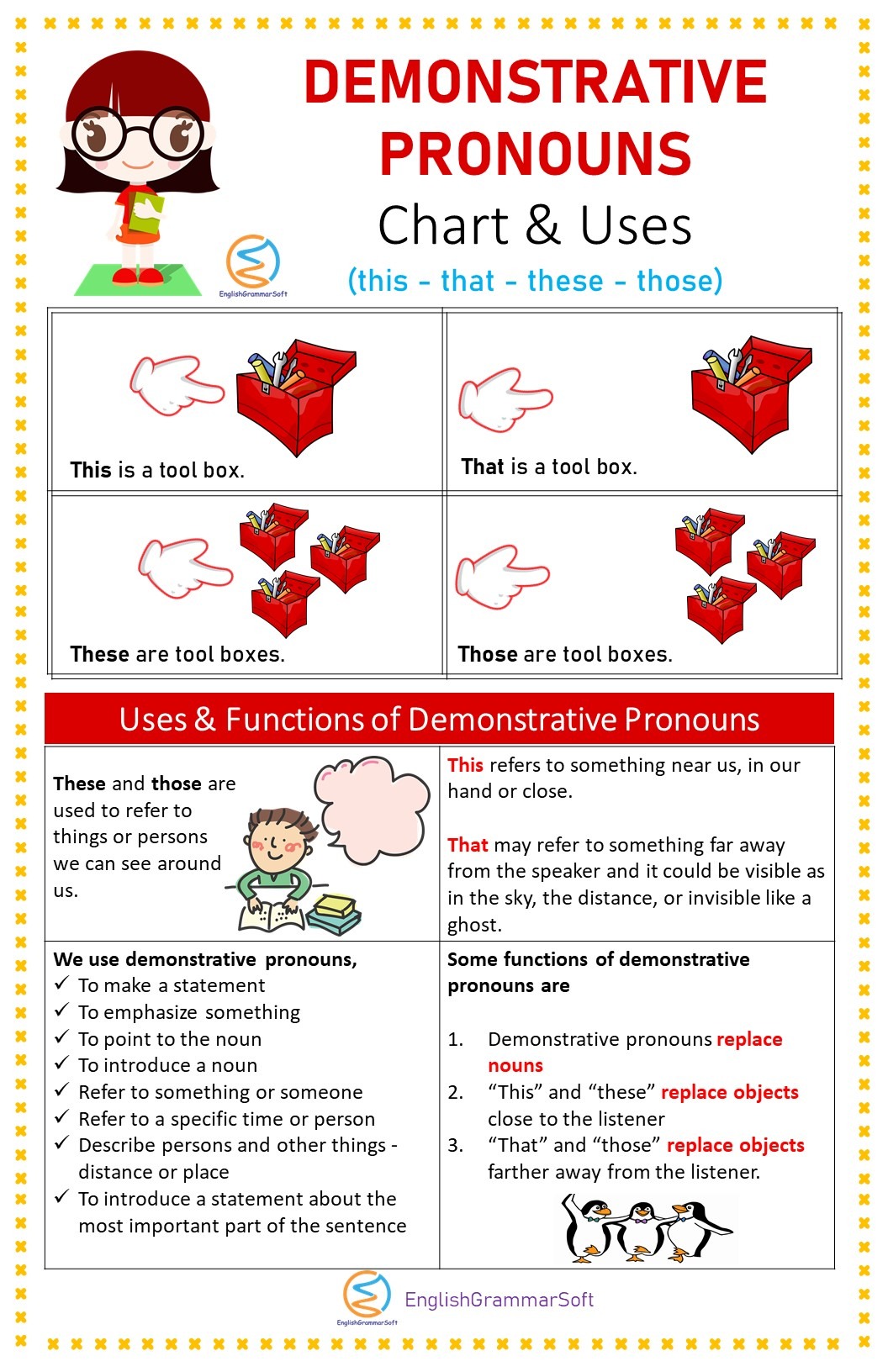
Demonstrative Pronouns (Chart, Uses, Examples & 50 Sentences
The 8 types of pronouns in English grammar with examples include 1) personal, 2) interrogative, 3) possessive, 4) demonstrative, 5) indefinite, 6) relative, 7) reflexive and 8) intensive. A pronoun is one of eight parts of speech. Parts of speech are the fundamental building blocks of the English language.

50 examples of pronouns in a sentence English Vocabs
Updated on May 30, 2023 You use pronouns every day. In fact, even if you don't know what pronouns are, you use them—and in this sentence alone, we've now used pronouns four times. Pronouns are words (or phrases) you substitute for nouns when your reader or listener already knows which noun you're referring to.

10 examples of pronouns in a sentence English Vocabs
For example, subject pronouns should use he and she instead of him and her. Object pronouns should include us and them instead of we and they. The correct use of personal pronouns in sentences also depends on the point of view. First-person pronouns include I, we, me, and us. The second-person pronoun is you.
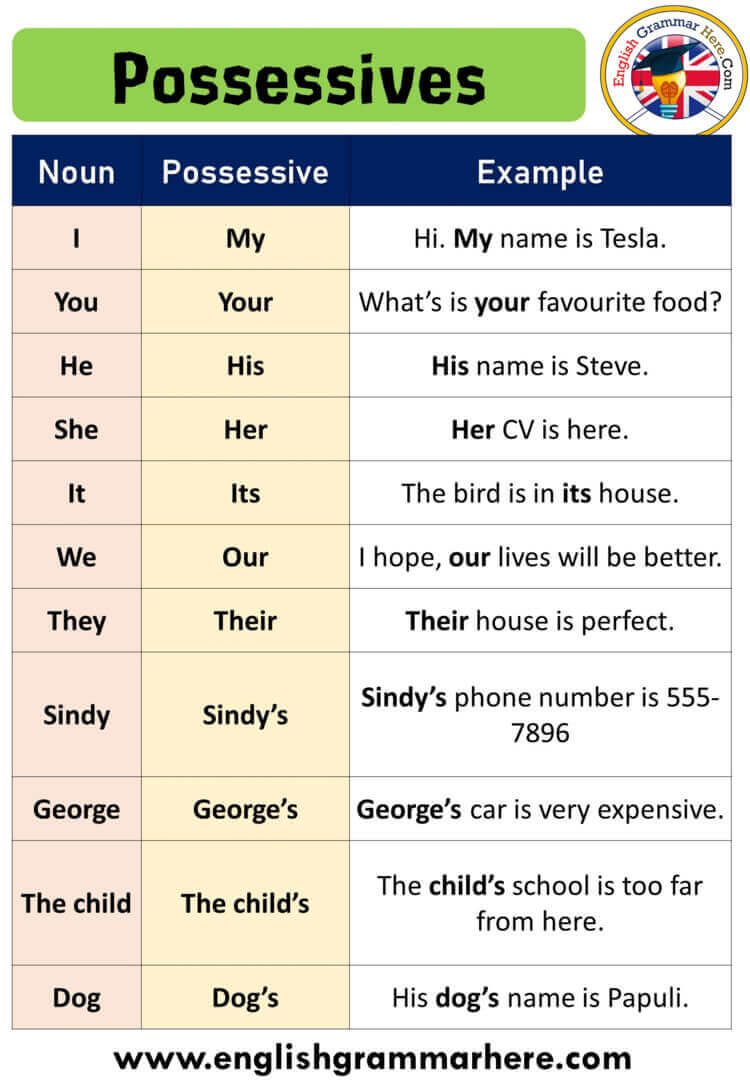
Possessive Pronoun Definition and Examples English Grammar Here
50 Example Sentences of Pronoun I have been waiting for you since morning. The book on the table is mine. Julia needs some grocery items. That is why she is going to market. He is not only a genius but also a well-educated person. Jon and Alan have known each other since childhood. They are friends forever.

Relative Pronouns in English, Meaning and Example Sentences English
A pronoun is a word that stands in for a noun, often to avoid the need to repeat the same noun over and over. Like nouns, pronouns can refer to people, things, concepts, and places. Most sentences contain at least one noun or pronoun. People tend to use "pronouns" to mean personal pronouns specifically, but there are many other kinds of.
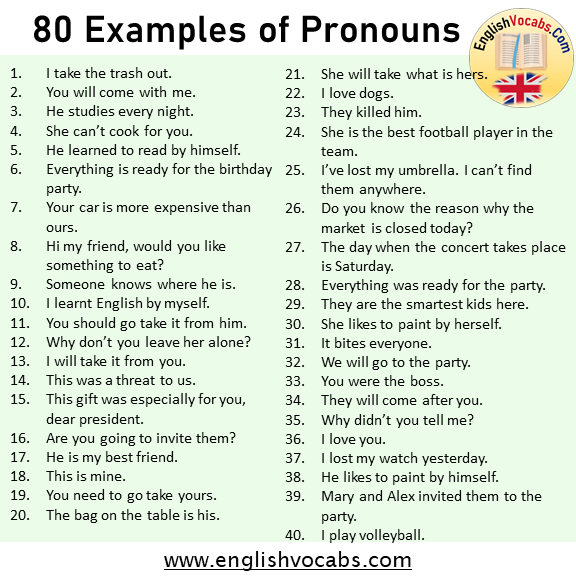
80 examples of pronouns in a sentence English Vocabs
Definition: A pronoun is a word that is used in the place of a noun in an English sentence. It can be present in the sentence where a noun is already present or to prevent a repetition of the noun in the sentence. examples: he, she, they, her, him, which, when, someone, etc. Examples of Pronoun in Sentences They are good at playing basketball.
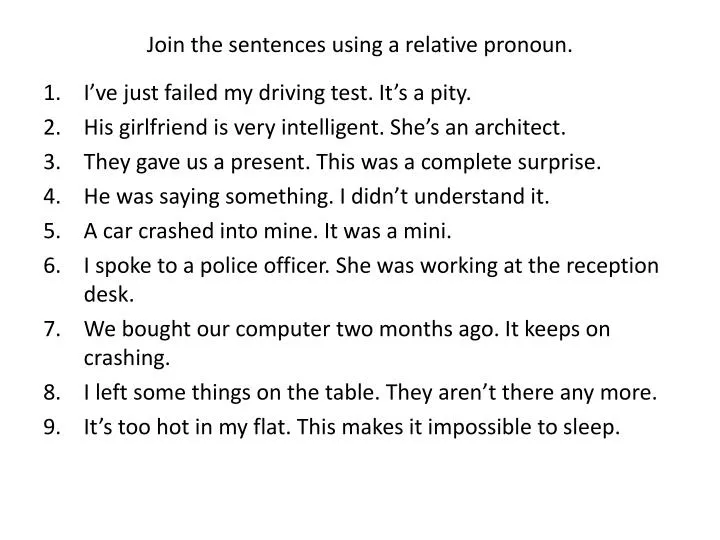
PPT Join the sentences using a relative pronoun. PowerPoint
Nouns can play many roles within a sentence. A pronoun is a subcategory of nouns. What is a noun? Nouns make up a lot of the English language. There are also many different types. These are all nouns: My father Your aunty The Queen Elvis Presley The following places are also nouns: My house Mount Everest The bathroom Nouns can also be things.

Indefinite Pronoun Definition, Examples, & List »
A pronoun sentence is a statement in which a pronoun (a word that takes the place of a noun) is used to convey a clear meaning. Instead of repeating the same noun, pronouns like "he," "she," "it," "they," etc., are utilized to enhance sentence fluidity and avoid redundancy. What is the best Example of a Pronoun Sentence?
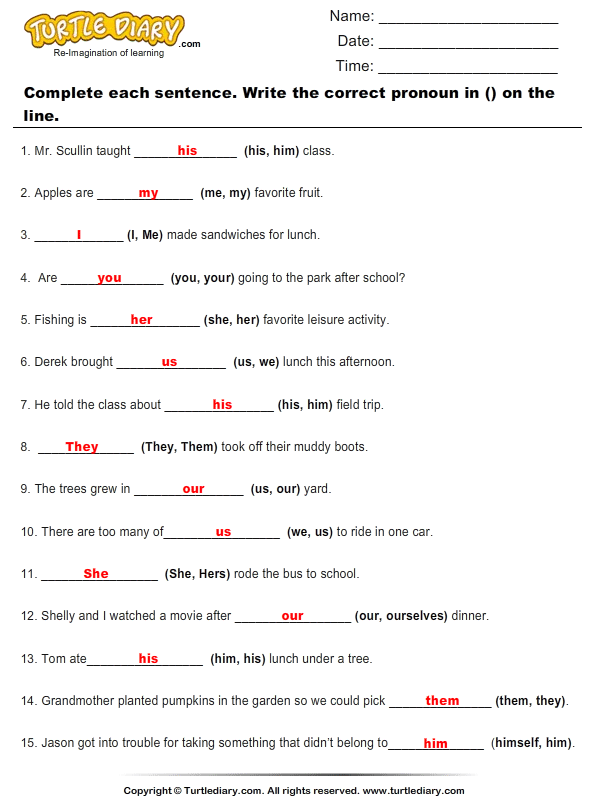
Complete Sentences with Pronoun that Best Fits Worksheet Turtle Diary
Barbara McLain Joseph M. Moxley This Guide to Writing with Pronouns in 2022 provides everything you need to know about pronouns. The Guide defines the different types of pronouns in English, analyzes the function of pronouns in sentences, and explains how to identify and fix pronoun errors.
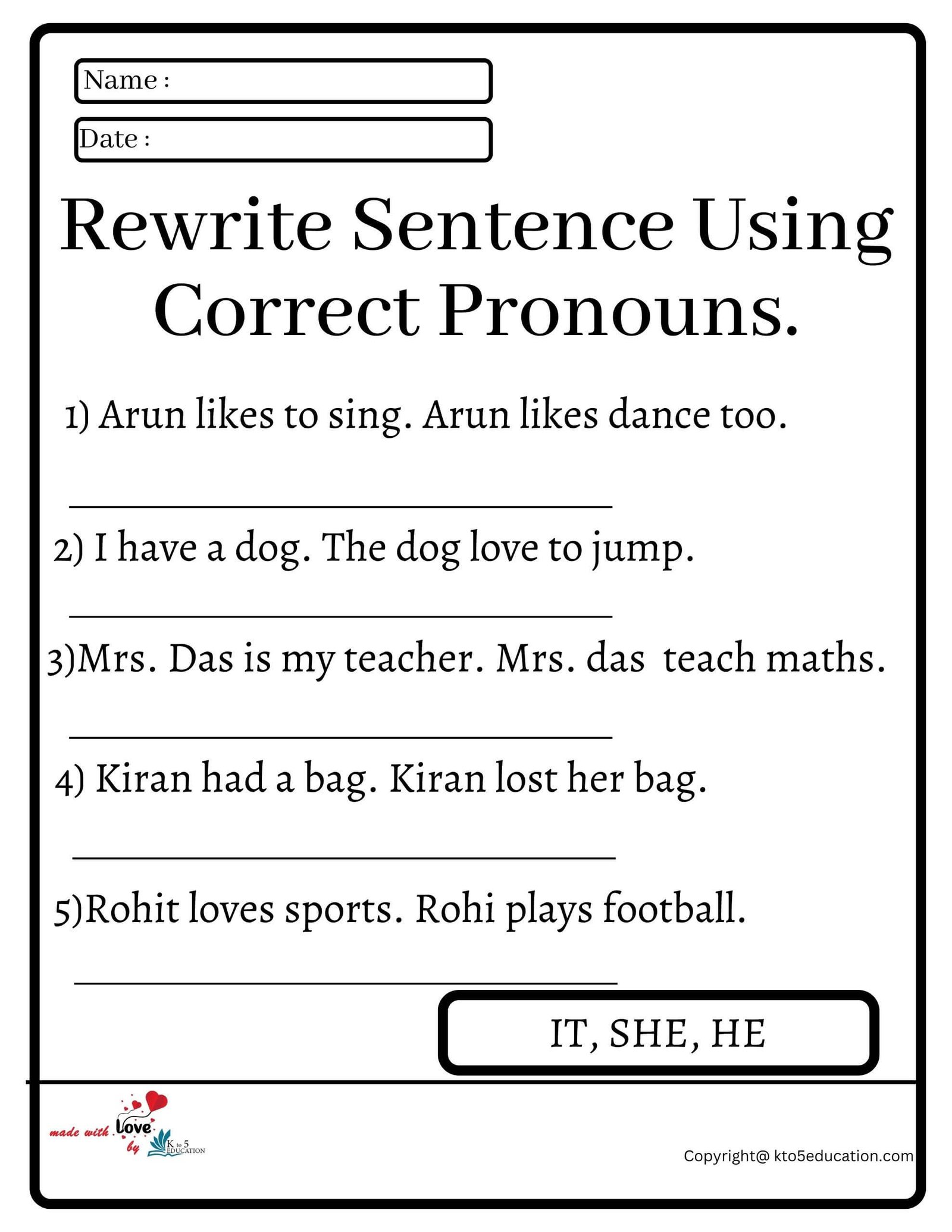
Rewrite Sentence Using Correct Pronouns Worksheet FREE
The great number of people consuming alcohol has declined. The great numbers of people consuming alcohol has declined. 1. next. last. Pronouns are words that take the place of nouns. We often use them to avoid repeating the nouns that they refer to. Pronouns have different forms for the different ways we use them.

20 Examples of Pronoun in Sentences »
Pronoun List Instead of nouns in a sentence, pronouns are used. It is used when something or a person has been mentioned before. Types of pronouns; Subject Pronouns In the sentence, they are used in the subject position at the beginning of the verb, such as; I, you, he, she, it, we, you. Object Pronouns

Pronoun Examples and Rules (20 Sentences) Pronoun examples, Pronoun
20 Examples of Subject Pronouns in Sentences: I am going to the store. You should study harder for your exams. He is a good soccer player. She loves to sing and dance. It is raining outside. We are going to the beach this weekend. They are my best friends. He and I went to the movies last night. She and her friends are going to the party.

Examples of Possessive Pronouns in Sentences English vocabulary words
Frequently asked questions Subject pronouns A subject pronoun (sometimes called a nominative pronoun) functions as the subject of a verb. That means that it represents the person/people or thing (s) that perform the action described. Because of this, it normally appears at the start of the sentence, followed by a verb. Examples: Subject pronouns

20 Examples Of Personal Pronouns Are In Sentences Onlymyenglish Images
Rule 1. Subject pronouns are used when the pronoun is the subject of the sentence. You can remember subject pronouns easily by filling in the blank subject space for a simple sentence. Example: ___ did the job. I, he, she, we, they, who, whoever, etc., all qualify and are, therefore, subject pronouns. Rule 2.